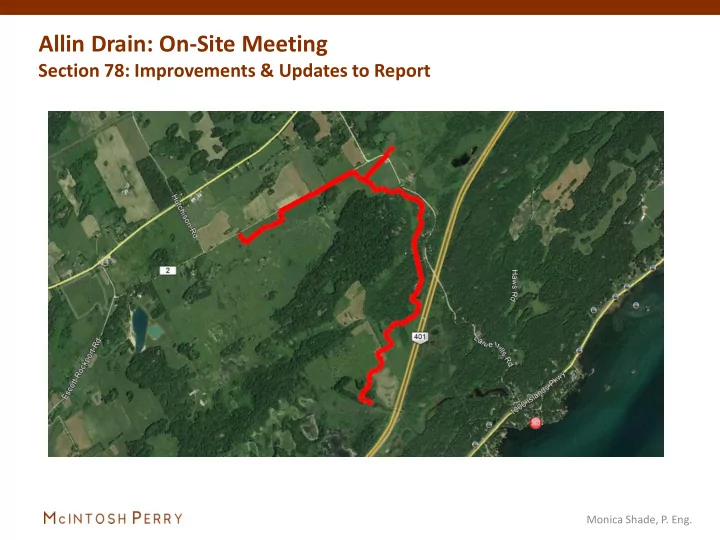

Allin Drain: On-Site Meeting Section 78: Improvements & Updates to Report Monica Shade, P. Eng.
Presentation Overview • Introduction to the Drainage Act • History of the Allin Drain • Section 78 of the Drainage Act • Next Steps • Questions
Introduction to the Drainage Act • The Drainage Act is legislation unique to Ontario • Means for landowners to solve drainage problems • Two methods under the Drainage Act: – Mutual Agreement Drains – Petition Drains • Allin Drain is an existing Petition Drain adopted under bylaw.
What is a Petition Drain? • Physically: a “Petition Drain” is a drainage system comprised of ditches, pipes or other means to convey water to a sufficient outlet.
What is a Petition Drain? • Legally: a “Petition Drain” is a drainage system that has been adopted by by-law. – Petitioned for by landowners for the right of drainage. – The municipality has the obligation to construct and maintain a “Petition Drain” to the design of an engineer. • Purpose: the removal of excess surface water from the properties within the watershed area. – Reduction of flooding (lawns, basements etc.) – Increased longevity of public infrastructure – Increased production on agriculture lands – Outlet for tile drainage
How is a Petition Drain Established? Petition to Engineer On-Site Drainage Issue Council Appointed Meeting Council to Report Construction Appeals Period Consider Prepared Report By-Law Costs Assessed Adopted
Petition Drain Summary Community Project – Petitioned for by landowners within a watershed – Developed through public process – Appeal periods for objections. Legal Existence – Adopted by by-law – All landowners have the right of drainage – All landowners share costs of construction/maintenance Municipal Responsibilities – Obligated to maintain drain on behalf of landowners
History of the Allin Drain • Originally partially constructed as an award drain; – Known as D.W. Hutchison Award Drain; • Petitioned to be converted to a Petition Drain in 1978; – New report prepared for the Allin Drain and Branch; – Latest governing report dated May 1979. • Consists of approximately 4.7 km of open ditch: – Allin Drain: 4.3 km – Guild-Allin Branch: 400 m • Area drains: – approximately 4,000 acres
What are the concerns with the current Engineer’s Report ? • Age of current Engineer’s Report; • Change in land use; • Land development – severances, etc. What are the concerns with the current Drain Conditions? • Alignment; • Culverts; • Erosion; • Blockages; • Vegetation growth; • Sedimentation. How can these issued be resolved? • Section 78 of the Drainage Act.
Section 78 of the Drainage Act This section allows for changes to a drain after a by-law has been adopted. • Changing the course of the drainage works. • Making a new outlet for the whole or any part of the drainage works. • Constructing a tile drain under the bed of the whole or any part of the drainage works. • Constructing, reconstructing or extending embankments, walls, dykes, dams, reservoirs, bridges, pumping stations or other protective works in connection with the drainage works. • Otherwise improving, extending to an outlet or altering the drainage works. • Covering all or part of the drainage works. • Consolidating two or more drainage works. 2010, c. 16, Sched. 1, s. 2 (27).
Section 78 Process (Improvements / Updates to Engineer’s Report) Improvements Engineer or Updates Appointed Required Engineer’s Council to Appeals Report Consider Prepared Improvements By-Law Where Cost Assessed Adopted Required
Engineer’s Report • Drawings (Plan/Profiles/Specifications) • Watershed Boundary • Cost Estimate • Assessments • Crossings • Future Maintenance
Next Steps 1. Respond to Questions / Drainage Concerns 2. Topographic Survey & Environmental Field Review 3. Confirm Watershed Boundary 4. Investigate Drain Improvements 5. Prepare Final Report 6. Submission of Final Report to Council for circulation to landowners. Topographic Survey & Environmental Review • Survey crew staff and a biologist will be out collecting information in the near future. • Staff will only enter properties where the Allin Drain resides.
Questions Contact Information Drainage@mcintoshperry.com
Recommend
More recommend